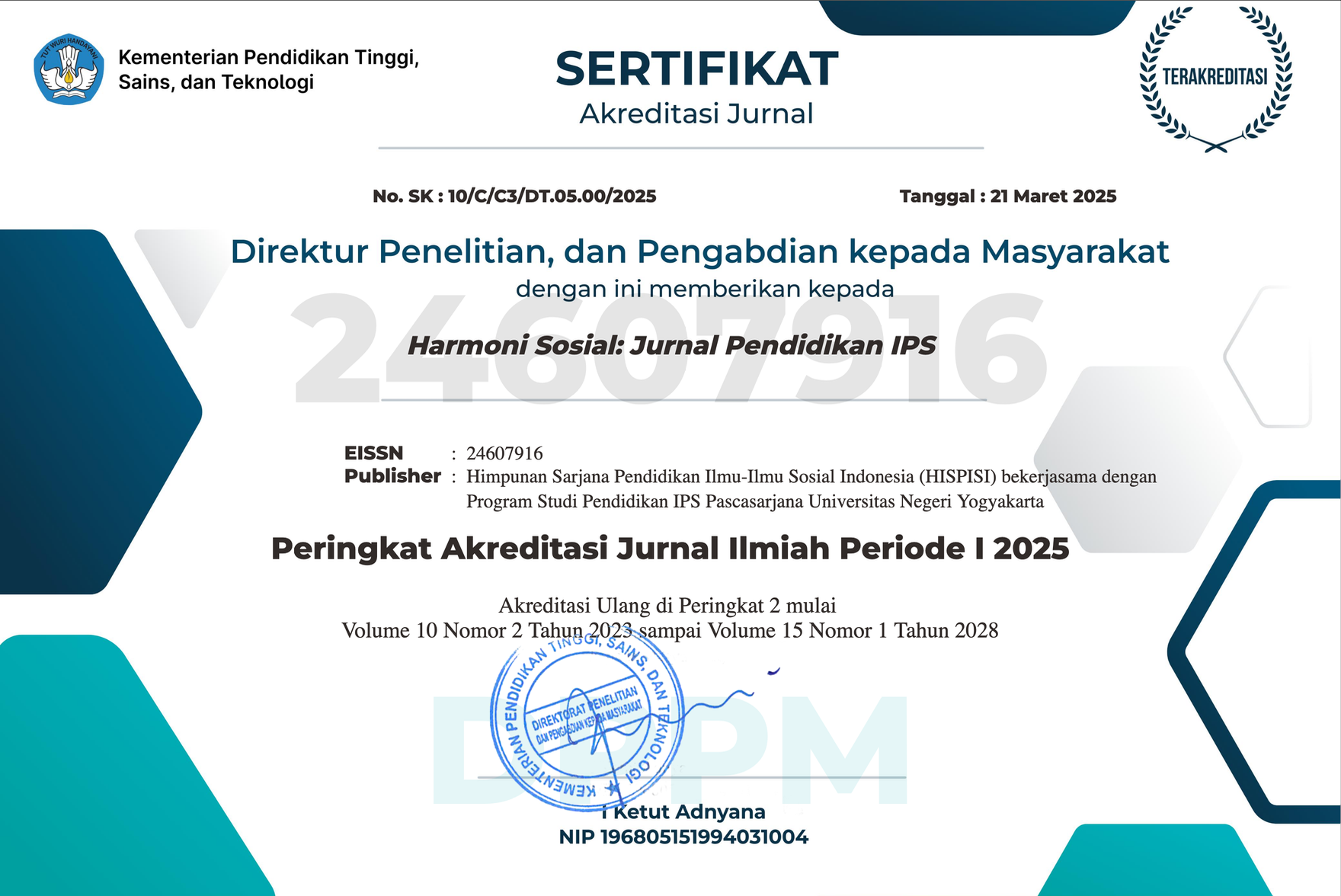Motorbike gang network in Yogyakarta: Socio-cultural studies between the relation of moral and religion habituation of local teenagers
Downloads
Downloads
Althof, W., & Berkowitz, M. W. (2006). Moral education and character education: their relationship and roles in citizenship education. Journal of Moral Education, 35(4), 495–518. https://doi.org/10.1080/03057240601012204
Bandura, A. (2002). Selective Moral Disengagement in the Exercise of Moral Agency. Journal of Moral Education, 31(2), 101–119. https://doi.org/10.1080/0305724022014322
Bhusal, T. (2020). Citizen participation in times of crisis: Understanding participatory budget during the COVID-19 pandemic in Nepal. ASEAN Journal of Community Engagement, 4(2), 321–341. https://doi.org/https://doi.org/10.7454/ajce.v4i2.1103
Birsyada, M. I. (2016). Dasar-dasar pendidikan IPS: Suatu pendekatan teoritis dan praktis. Yogyakarta: Ombak.
Birsyada, M. I., & Permana, S. A. (2019). Pendidikan etika bisnis: Kajian sosial budaya masyarakat pengrajin perak kota Gede (Septian Aji Permana, ed.). Yogyakarta: Tunas Gemilang Press.
Birsyada, M. I., Wasino, W., Suyahmo Suyahmo, & Joebagio, H. (2017). The business ethics of royal family: Mangkunegara IV, Sufism and economy in Java. International Journal of Applied Business and Economic Research, 15(7), 33–57. Retrieved from https://www.researchgate.net/publication/317746048_The_business_ethics_of_royal_family_Mangkunegara_IV_Sufism_and_economy_in_Java
Cobigo, V., Martin, L., & Mcheimech, R. (2016). Understanding community. Canadian Journal of Disability Studies, 5(4), 181–203. https://doi.org/10.15353/cjds.v5i4.318
Creswell, J. W. (2014). Penelitian kualitatif dan desain riset (memilih diantara lima pendekatan) (3rd ed.). Yogyakarta: Pustaka Pelajar.
Hardati, P., Rijanta, R., & Ritohardoyo, S. (2020). Rural farm and non-farm linkages in a predominantly manufacturing region: The case of Semarang Regency, Indonesia. Indonesian Journal of Geography, 52(1), 53–60. https://doi.org/10.22146/ijg.47450
James, M., & Pedder, D. (2006). Beyond method: Assessment and learning practices and values. The Curriculum Journal, 17(2), 109–138. https://doi.org/10.1080/09585170600792712
Joly, B. M., Williamson, M. E., Bernard, K. P., Mittal, P., & Pratt, J. (2011). Evaluating community outreach efforts: A framework and approach based on a national mental health demonstration project. Journal of MultiDisciplinary Evaluation, 8(17), 46–56. Retrieved from https://journals.sfu.ca/jmde/index.php/jmde_1/article/view/327
Lickona, T. (1991). Educating for character: How our schools can teach respect and responsibility. New York: "Ž Bantam.
Lovat, T., & Clement, N. (2008). Quality teaching and values education: Coalescing for effective learning. Journal of Moral Education, 37(1), 1–16. https://doi.org/10.1080/03057240701803643
Malanchuk, I. R., & Ocha, M. N. (2005). Academic librarians and outreach beyond the college campus. The Southeastern Librarian, 53(3), 23–29. Retrieved from https://digitalcommons.kennesaw.edu/seln/vol53/iss3/11/
Mulder, N. (2005). Mysticism in Java: Ideology in Indonesia. Yogyakarta: Kanisius.
Palupi, Y. (2017). Implementasi pendidikan karakter berbasis budaya pada peserta didik usia sekolah dasar. International Conference on Education and Science, 82–86. Retrieved from http://icons.upy.ac.id/wp-content/uploads/2017/11/yulia-palupi.pdf
Permana, S. A., Setyowati, D., Slamet, A., & Juhadi, J. (2017). Society management in manage economic after Merapi disaster. International Journal of Applied Business and Economic Research, 15(6), 1–10. Retrieved from https://www.researchgate.net/publication/317746045_Society_management_in_manage_economic_after_Merapi_disaster
Ponzetti Jr., J. J. (2014). Governance in the cloister: Lessons from the rule of benedict for sustainable leadership in communal organizations. Journal of Leadership, Accountability and Ethics, 11(3), 25–35. Retrieved from http://digitalcommons.www.na-businesspress.com/JLAE/PonzettiJJ_Web11_3_.pdf
Sagiv, L., Roccas, S., Cieciuch, J., & Schwartz, S. H. (2017). Personal values in human life. Nature Human Behaviour, 1(9), 630–639. https://doi.org/10.1038/s41562-017-0185-3
Su'ud, A. (2008). Revitalisasi Pendidikan IPS. Semarang: Unnes Press.
Višňovskí½, E. (2017). On the value of human life. Ethics & Bioethics, 7(1–2), 85–95. https://doi.org/doi:10.1515/ebce-2017-0003
Warren, J. L., & Sellnow, D. D. (2021). Increasing learning while serving the community: Student engagement as the key to learning in a basic public speaking course. Journal of Higher Education Outreach and Engagement, 25(1), 25–36. Retrieved from https://tme.journals.galib.uga.edu/jheoe/article/view/2079
Wasino, W. (2006). Wong Jawa dan wong Cina: Liku-liku hubungan sosial antara etnis Tionghoa dengan Jawa di Solo tahun 1911-1998 (1st ed.). Semarang: Unnes Press.
Zlotnikova, I., & Weide, T. van der. (2015). Community outreach projects as a sustainable way of introducing information technology in developing countries. International Journal of Education and Development Using Information and Communication Technology (IJEDICT), 11(1), 55–79. Retrieved from https://www.learntechlib.org/p/151052/
Zuchdi, D. (2010). Humanisasi pendidikan: Menemukan kembali pendidikan yang manusiawi. Jakarta: Bumi Aksara.
The Authors submitting a manuscript do so on the understanding that if accepted for publication, copyright publishing of the article shall be assigned to Harmoni Sosial: Jurnal Pendidikan IPS
 | Harmoni Sosial: Jurnal Pendidikan IPS by http://journal.uny.ac.id/index.php/hsjpi is licensed under a Creative Commons Attribution-ShareAlike 4.0 International License. |









 ISSN Print
ISSN Print









